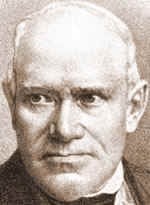Anderssen Karl Ernst Adolf (06.07.1818 – 13.03.1879)

Anderssen was born in Breslau, Germany (now Wroclaw, Poland). He was a Mathematics teacher at Friedrichs Gymnasium in Breslau. He learned chess in 1827 at the age of 9.
In 1842, he published a book containing 60 chess problems called Aufgaben fur Schachspieler. In 1846, he joined the editorial staff of Schachzeitung (later Deutsch Schachzeitung). In 1848 he drew a match with Harrwitz, winning 5 games and losing 5. In August 1851, he won the 1851 London International, defeating Kieseritzky, Szen, HowarStaunton, and Wyvill. Anderssen was representing a Berlin chess club. His first place prize was a silver cup.
He defeated Kieseritsky in brilliant style in a friendly game played at the Simpsons on the Strand. This King’s Gambit Accepted is known as the Immortal Game. Anderssen mated Kieseritsky in 23 moves.
In 1852, Anderssen beat Dufresne in Berlin using the Evans Gambit. It became known as the Evergreen Game.
On December 25 1858, he went to Paris to play Paul Morphy. He lost the match of 11 games (+2,=2 and-7) in 9 days.
In 1861, he defeated Kolisch with 4 wins, 2 draws, and 3 losses. This was the first match played with a time limit. An hourglass gave each player 2 hours to make 24 moves.
In June 1862, he took first place at the London International. This was the first round-robin tournament in which everyone plays each other.

In 1864 he was co-editor of the Neue Berliner Schachzeitung, with Neumann.
In January 1865 he was given an honorary degree, Doctor of Philosophy, for his work as a Mathematics teacher.
In 1866, in London, he lost a match with Steinitz, winning 6 games and losing 8. This was the first time mechanical clocks were used.
In 1869, he won at Hamburg and Barmen. In August 1870, he won an international tournament in Baden-Baden ahead of Steinitz and Blackburne.
In 1871, he won at Krefeld. He won at Leipzig in 1876. In 1877, he took 2nd at Leipzig (won by Paulsen). This tournament was organized by a group of German chess fans to commemorate the 50th anniversary of Anderssen’s learning of the chess moves. This is the only tournament ever organized to commemorate a competitor.
He died in Breslau on March 13 1879, of a heart attack. His obituary ran 19 pages in the May 1879 issue of Deutsch Schachzeitung. (Bill Wall)
The historian N. Divinsky wrote “Anderssen’s lively, fresh play was full of ideas, surprises and happy inspirations. Sacrifices were his stock of trade and he showed enormous ingenuity both in conception and execution. His play was absolutely brilliant and in stark contrast to his quiet and modest life-style”.
Historical ELO:2600.



